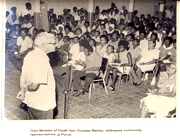Who We Are
Overview
The Social Development Commission (SDC) is the principal community organization agency working with Jamaica’s 775 communities. Positioned in the Ministry of Local Government & Rural Development, the SDC continues to execute its legal mandate to inter alia, “promote and control schemes for, and to do any act or thing which may directly or indirectly serve the advancement of – sport, social, cultural & economic development – for the people of Jamaica and workers in particular”(S7/1965).
The SDC’s approach to community development is in line with international best practices where communities are involved in identifying and designing strategies aimed at improving their quality of life. This essentially means safeguarding human rights as the fundamental principle guiding the development of the country. SDC’s core outputs are focused on a strong community governance mechanism, reliable disaggregated data to produce community profiles and community priority plans and programmes that identify needs, the required partnerships for success and the most suitable environment for quality service delivery. Central to the focus of the organization is the reform of local governance and its entrenchment in the constitution.
The SDC has had notable achievements in transforming the Jamaican landscape through milestones reached in each of the respective core output areas. As a platform for the Local Government Reform process in Jamaica there are 4637 active Community Based Organizations (CBOs); 415 active Community Development Committees (CDCs) representing 53% of 775 communities, 44 active Development Area Committees (DACs) accounting for 61% of 73 Development Areas; and 11 or 85% active Parish Development Committees (PDCs).
There has also been progress in terms of policy as the revised local government reform act is now a motion to the lower house of Parliament.
For the SDC, effective governance will continue to be the central focus supported by strengthened research and priority planning processes, as it is only through people participation that Jamaica will be the place of choice to live, work, raise families and do business.
Core Values
- Shared Vision, Team Work and Commitment
- Openness and Honesty
- Non-partisan
- Merit and Equal Opportunity
- Professionalism and Efficiency-based
- Non-authoritarian and Inclusive
- Responsibility and Self Reliance
- Patriotism and Nation-building
History

The Social Development Commission (SDC) has been serving Jamaican communities since 1965.The organization’s vision has been a Jamaican Society where all citizens actively participate in a process and benefit from the resulting good governance, economic prosperity, sustainable environment and social well- being.
Its mission is to facilitate the empowerment of citizens in communities, enabling their participation in an integrated, equitable, sustainable National Development Process.
The SDC is currently working towards fulfillment of both its Vision and Mission in 775 community organisations across the island.
In 1965, through a Change of Name and Validation Act, Jamaica Social Welfare Commission became known as the Social Development Commission (SDC). Under Minister of Development & Welfare the Hon. Edward Seaga, the Commission was split into four separate agencies grouped under the newly created SDC. Its functions were:
• To promote manage and control schemes for, and to do, any act or thing which may directly or indirectly serve the advancement of sport and the general interests and the social, cultural or eco
• nomic development of the people of the island and in particular the rural and urban workers.
• To administer the affairs of the Jamaica Youth Corps
• In particular and without prejudice to generality of the provisions …to carry out such community development projects and social welfare activities as, in the opinion of the Commission, are desirable
Subject to the provision of the law, it shall be lawful for the Commission to do anything and to enter into any transaction, which in the opinion of the Commission, is necessary to ensure the proper discharge of its functions.

This period brought an emphasis on the development of more comprehensive training programmes linked to viable skills marketable in the expanding economy. The thrust of the Commission between 1972 and 1980 was towards decentralization of social, political and economic activities and building democratic structures. The formation of Community Councils and Youth Clubs were central strategies in meeting these objectives. Over the next 14 years there was a focus on the development of small businesses for production. The establishment of Community Based Economic Enterprises – the predecessor of MIDA – was the special focus in seven parishes and much attention was given to project development.
Since 1995 a National Poverty Eradication Programme and the Local Government Reform Programme have taken centre stage as the national initiatives that are guiding the Commission as the central agency creating and deepening mechanisms for the involvement of civil society in governance.
Formation of local structures- District Development Committees, Community Development Committees, Development Area Clusters and Parish Development Committees as managing committees and decision influencing bodies at each level, deepen the democratization process for participatory sustainable development. Under the present structure, the SDC’s Head Office at 22 Camp Road in Kingston gives oversight of the operations across the island.

